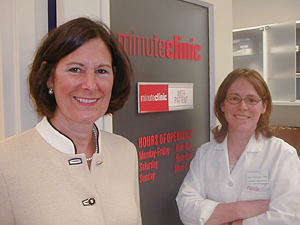|
Audio
Photos
Your Voice
|
Grocery, discount stores stocking up on health care
August 22, 2004
Imagine dropping by the store for a loaf of bread, a quart of milk, and a strep throat culture. In a few major cities, small health clinics are appearing inside grocery stores and discount retailers like Target. The clinics are meant to be a hassle-free alternative to crowded waiting rooms at the family doctor.
Shoreview, Minn. — It's a weekday morning in the Twin Cities suburbs. Carolyn Thompson bursts through the door of a Super Target -- moving fast, with three children in-tow. She's heading for the MinuteClinic, just beyond the cashier lanes.
Carolyn does not want to chat on the way in, and she does't want to give her real last name. On the way out, she explains: This visit was for her, not the kids.
"This was a urinary infection," she says. "Hence we hold off on the last name. I don't want that public knowledge."
 | |||
Carolyn has been here about a half-dozen times, mostly for the children. For basic infections like an earache, she says the cost is comparable to the family doctor, but the experience certainly is not.
"The speed is wonderful. You just don't have to wait hours and hours in order to get an appointment, so you can fit it in before school or after school or times when the pediatrician might be really crammed," she says. "And you can accomplish any shopping or what-not that you want to get done."
There are 14 MinuteClinics around the Twin Cities, most in Target stores and Cub Foods. Just this month the company expanded, opening eight more in suburban Baltimore. Companies with similar concepts have sprung up in Milwaukee and Louisville.
"Outside our clinic is a menu really not all that different from what you'd find at a McDonald's restaurant," says Linda Hall Whitman, CEO of QuickMedx, the company that owns the MinuteClinics.
She gestures to a signboard next to the sliding clinic check-in window. "So for example, it says if you're coming for a sinus infection, it's $41. If you think you might have a bladder infection, that's $44. A strep throat with a rapid test, that's $44 -- an overnight culture is another $15."
The list goes on: poison ivy treatment, pregnancy test, flu shot. Signs in Target's aisles of backpacks and notebooks remind parents to stop by for back-to-school vaccinations. The clinics are equipped to handle minor health problems. Patients with chronic illness, broken bones, or serious cuts are referred to a doctor's office or the emergency room.
 | |||
Each clinic is staffed by a nurse practitioner or physician's assistant. They're certified to handle many of the routine duties of a doctor in family practice, including writing prescriptions. Despite a current shortage of nurses willing to work in U.S. hospitals, QuickMedx has no trouble filling its positions.
At this clinic it's former school nurse Ann Somers who's in charge. She notes that the clinic is located only a hundred feet away from the Target pharmacy.
"They are a wealth of information for us, and they also will refer people back to us because people have a lot questions about certain things," Somers says. "They can say, 'There's a clinic right over there that can help you better than we can.'
The clinics are included in the networks of most major health insurers here. Some local employers have created new, discounted co-pays to encourage people to use them.
You have to wonder what's in it for the stores, inviting dozens of sick people through their doors each day. Whitman says the people may be sick, but their money is certainly healthy.
"While here, they typically do shop. They may buy their over-the-counter here, and they usually tend to fill their prescription here," she says.
Not every retailer is sold on in-store medical care. In fact the world's biggest retailer, Wal-Mart, plans to limit its health care to the existing optical centers. The retail giant told QuickMedx it has no interest in the concept, essentially saying that children getting shots and crying babies don't jive with its smiley-face image.
|
News Headlines
|
Related Subjects
|

